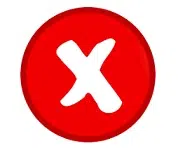 The term fallible derives from the Latin fallĕre , which can be translated as “to deceive.” Its most distant etymological antecedent, however, is found in Low Latin fallibilis .
The term fallible derives from the Latin fallĕre , which can be translated as “to deceive.” Its most distant etymological antecedent, however, is found in Low Latin fallibilis .
This adjective is used with reference to that or that which may fail or incur a fault . What is fallible, therefore, is not perfect nor does it guarantee effectiveness. For example: “The tournament organizers announced that they will modify the competition method since they consider that the current system is fallible” , “This antivirus program is fallible because it often does not recognize malicious files that can cause an infection” , “The striker ", who does not usually fail in this type of situation, proved to be fallible and wasted a clear chance to score."
Every human being is fallible since they can make mistakes . Depending on the context and the action in question, failures can be minor or very serious.
Take the case of a neurosurgeon (a doctor who specializes in surgeries on the nervous system). Because the lives of his patients depend on his actions, the ideal would be for this professional to be infallible: that is, he could not fail. However, being fallible like any person, there is a chance of error in your activity. Through study, experience, teamwork and technology, the neurosurgeon will try to reduce these probabilities as much as possible.
Let 's look, on the other hand, at the issue of free throw shooting in basketball . For some players, shooting is relatively easy; for others, much more difficult. All basketball players, anyway, are fallible. Even the most accurate from the shooting line, like Stephen Curry , who usually makes more than 90% of his free throws.
 Throughout our lives, social pressures, which usually begin from our elders, attempt to lead us to a path of success . We are taught from a young age to look up, to aim as high as we can, and this leads us to think that no achievement less than perfection is enough. Needless to say, feeling this is harmful and can put a person's entire emotional structure at risk.
Throughout our lives, social pressures, which usually begin from our elders, attempt to lead us to a path of success . We are taught from a young age to look up, to aim as high as we can, and this leads us to think that no achievement less than perfection is enough. Needless to say, feeling this is harmful and can put a person's entire emotional structure at risk.
Achieving perfection is not possible, since we have no evidence that such a state exists. We like to say that "nature is perfect," for example, to exalt the apparent balance in which its species develop and the processes they carry out, but even within this framework we can find defects, many of which give rise to the so-called evolution . Being fallible, therefore, can sometimes open the doors to good things.
The synonyms of the term fallible that we can find in the dictionary present a fairly broad picture, which includes the two meanings mentioned so far, as we can see below: equivocal, misleading , inaccurate, erroneous, uncertain, mistaken and insecure . We can notice that some refer to "not telling or showing the truth", while others relate to the imperfection inherent to fallibility.
On the other hand, among its antonyms we find the following three: certain, unequivocal and infallible . It is interesting to note that in everyday speech it is not common to come across this word, but instead they usually appear imperfect or defective , among others that vary depending on the region and the area in which we speak. However, its infallible antonym is widely used in popular language, despite containing it in its entirety and simply being distinguished from it by the prefix in- . This does not demonstrate the unpredictability of the language, perhaps because it is also something fallible: for example, it cannot guarantee the effectiveness of its rules in all cases, and that is why there are so many exceptions.
